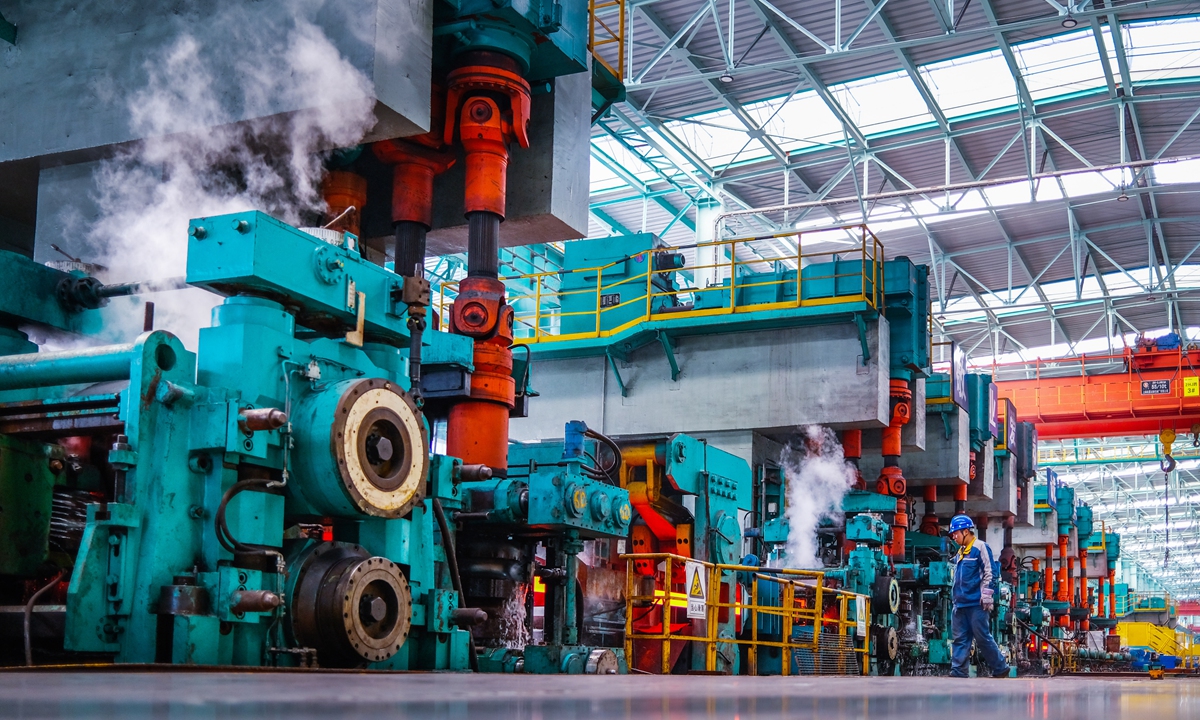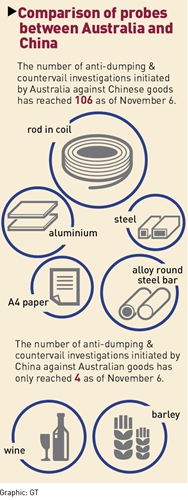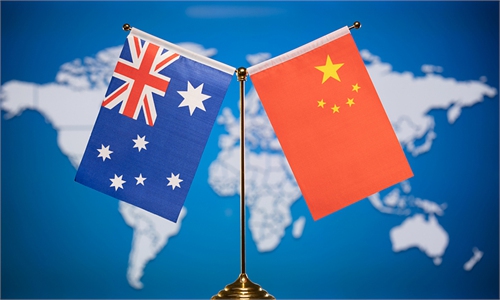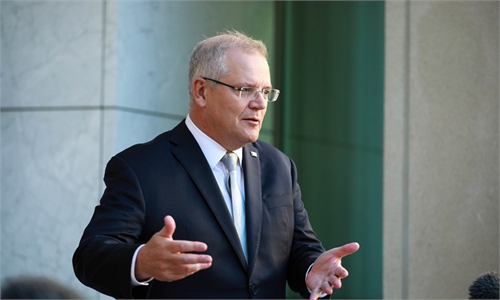One-sided trade investigations damage China-Australia relations
China reserves right to pursue remedies: experts

An alloy bar production line at a steel producer in Ma'anshan in East China's Anhui Province on November 11 Photos: cnsphoto
China continues to uphold the principals of free trade and multilateralism, sustaining trade with partners including Australia, despite the growing political and economic challenges in the post-pandemic era. In contrast, Australia has pursued a discriminatory strategy focused on abusing trade remedies aimed at suppressing Chinese products and in doing so breaching the principles of free market economics and the bilateral free trade agreement, according to analysts.
According to recent official remarks by Chinese foreign affairs officials, Australia has launched more than 100 anti-dumping and countervailing investigations against Chinese products, while the number of Chinese anti-dumping and countervailing investigations against Australian products is in the single digit.
"To date Australia has launched as many as 106 anti-dumping and anti-subsidy investigations against Chinese products, while China has only initiated four investigations against Australian goods," Foreign Ministry spokesperson Wang Wenbin said at a regular press conference on November 6.
Against the backdrop of the global pandemic, Australia's measures run counter to Chinese calls for unity in the fight against COVID-19 and restraint in the use of heavy-handed trade remedies.
Earlier this year, Australia launched anti-dumping probes against Chinese aluminum, steel and office paper, data from the Australian Anti-Dumping Commission showed.
The probe against Chinese aluminum micro-extrusions began in February, followed closely by a probe into steel pipes and tubes in March and another probe on copy paper in April.
Analysts said these probes launched at the request of Australian manufacturing firms are more often a reflection of the high-cost of manufacturing in Australia, rather than Chinese companies' deliberate attempts to dump goods into the Australian market.
Meanwhile, China's tariffs on Australian products dumped into the Chinese market, including barley and wine, are intended to safeguard the interests of domestic industries while maintaining market order.
Industry representatives told the Global Times that a massive influx of cheap Australian barley has threatened to impact domestic barley growers, damaging local farmers' ability to grow the crop.
"Australian wine and barley have created difficulties in the production and operation of domestic Chinese companies as Australian export prices are set below the fair market value, thus putting domestic producers at an unfair disadvantage," Ning Tuanhui, a research assistant with the China Institute of International Studies, told the Global Times on Tuesday.
China initiated anti-dumping and countervailing investigations against barley imports from Australia in accordance with Chinese laws and WTO rules in May, which was the only trade remedy investigation against the country since the establishment of the diplomatic ties with Australia, Chinese Commerce Minister Zhong Shan said on May 25.
Over the same period, Australia has launched 100 trade remedy investigations against China, including three so far this year, said Zhong.
"Australia has launched countermeasures on trade, anti-dumping and countervailing investigations against China - its largest trading partner - at such as high rate, effectively politicizing two-way trade relations, China has sought to address conflicts in an orderly and balanced way. This reflects the big difference in mindset between the two countries regarding free trade," said Ning.

In stark contrast with Australia's stance toward China, China has yet to bring any anti-dumping cases against Australia at the WTO.
The Free Trade Agreement (FTA) between the Chinese and Australian governments officially came into effect on December 20, 2015 with the first tax cut and the second tax cut on January 1, 2016.
The China-Australia FTA aims to reduce trade barriers by lowering tariffs on both sides, anti-dumping cases work to reduce the effect of trade liberalization created by the FTA, Tu Xinquan, President of the China Institute for WTO Studies at the University of International Business and Economics, told the Global Times on Wednesday.
"Anti-dumping measures are equal to additional tariffs, which are generally relatively high, and therefore have negative repercussions on bilateral trade," said Tu.
From January to September, the combined import and export volume of goods between China and Australia hit $122 billion, down 3.6 percent year-on-year. The total trade value of China's exports to Australia reached $36.9 billion, while the value of China's imports from Australia was $85.7 billion, reflecting a large trade imbalance between the two countries, according to open statistics.
"China imports a large volume of Australian products and has only initiated a few anti-dumping investigations, while Australia imports a far lower quantity of Chinese products but has misused the investigations powers over 100 times," said Tu, noting that although China does not object to anti-dumping measures, there are clearly instances in which Australia has abused these remedies.
"Judging from the current volume of trade between China and Australia, it's clear that the Australian government is abusing these measures," added Tu.
However, in the face of the recent relentless persecution by the Australian government, experts have stated that China reserves the right to lodge a complaint at the WTO against several Australian products.
While Australia escalates confrontation with China fueled by politically-driven trade remedies, Yu Lei, a chief research fellow at the Research Center for Pacific Island Countries at Liaocheng University, said China should also step up related studies and work on measures to prevent China's exports to Australia from falling victim to the abuse of trade remedy measures.
"Australia imports a wide range of goods from China, but it only exports a few categories of commodities to China," Yu said. "This means China's exports to Australia are more at risk from anti-dumping probes."
Yu said Chinese companies are losing over $100 billion each year due to trade remedy measures initiated by foreign governments in the global market.
In addition to trade, Australia, as a core member of the Five Eyes alliance, has imposed a number of restrictions against Chinese companies and goods on so-called "national security" grounds, creating a very unfriendly atmosphere for bilateral business cooperation, analysts said.
China lodged a complaint with the WTO over Australia's ban on Huawei participating in the country's 5G network construction, according to a report by the Sydney Morning Herald on April 14, 2019.



